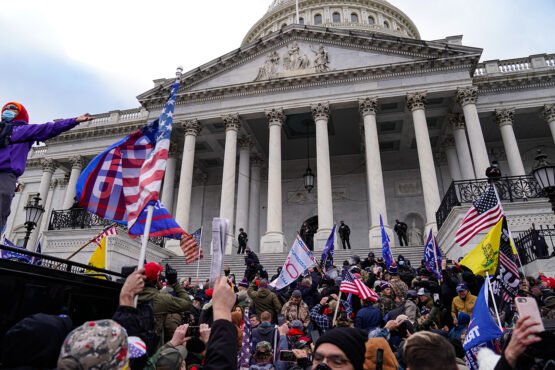Will the Jan. 6 hearings make a difference? Stanford scholar discusses how they might shift public perception
The hearings will be a test for the Republican Party, and whether or not it can successfully disavow its extremist wing, says Stanford scholar.
As the U.S. House committee investigating what led up to the Jan. 6 Capitol attack continues to present evidence in a series of five public hearings, there is real potential to shift public perceptions of former President Donald Trump’s culpability in the conspiracy to overturn the results of the 2020 presidential election, Stanford scholar Didi Kuo said.

The attack at the Capitol on Jan. 6, 2021, was an unprecedented assault on modern American democracy, shocking even those who were close to President Trump and accustomed to his lies, says Stanford scholar Didi Kuo. (Image credit: Getty Images)
While the hearings might not sway Trump’s loyal base, the electoral calculus of Republican candidates and leaders could be changed, said Kuo, a scholar of democracy and political parties.
Here, Kuo discusses what impact the events of Jan. 6 and the “Big Lie” – a catchall phrase used to describe Trump’s claim that the presidential election was stolen, despite research proving otherwise – will have in upcoming midterm and national elections and also on the Republican Party, particularly whether or not Republicans will repudiate the extremist wing that was on full display on Jan. 6, Kuo said.
Kuo is the associate director for research and senior research scholar at Stanford’s Center on Democracy, Development, and the Rule of Law. She is the author of Clientelism, Capitalism, and Democracy: The Rise of Programmatic Politics in the United States and Britain (Cambridge University Press, 2018).
According to your research, how can right-wing extremism and the white supremacy that was on display on Jan. 6, 2021, at the nation’s Capital be addressed? Will the Jan. 6 committee hearings matter?
January 6 was an unprecedented assault on modern American democracy, and, as we are learning from the hearings, shocked even those who were close to President Trump and accustomed to his lies.
The extremism and white supremacy on display in the United States are part of a broader pattern of democratic backsliding around the globe. There are concerns now that many countries, longstanding and emerging democracies alike, are less committed to democratic norms and processes. A set of illiberal leaders have come to power through democratic elections; they then follow a playbook of undermining democracy. They attack elections as unfair, then use that as a pretext to rewrite the rules of elections and stack impartial watchdog agencies and courts with political cronies. They often rely on racist appeals and rail against minorities, invoking the need to purify the country and restore so-called traditional values.
One of the most dangerous things about democratic backsliding is that much of it happens out of public view, or without much public backlash. It’s not clear, for example, if voting restrictions or changes to election administration at the state level will really be subject to public scrutiny. Fortunately, the Jan. 6 hearings have the potential to move the needle on public perceptions of President Trump’s culpability. Most Americans feel that democracy is in chaos, and most Americans oppose the violence on Jan. 6. Mobilizing support for holding President Trump accountable can go a long way toward restoring democratic principles.
What lessons can we learn from the Jan. 6 committee hearings about how to protect democracy and democratic processes?
At a minimum, democracy requires free and fair elections and peaceful transitions of power. The Jan. 6 hearings are showing that President Trump and his allies sought to overturn the outcome of a legitimate national election, that they fomented violence, and that they expected all other Republicans to go along with the Big Lie. His promulgation of the Big Lie has done real damage to democracy in the United States, with many Republican candidates campaigning on the “stolen” election, and Republican state legislatures passing laws that politicize election administration.
The Big Lie and Jan. 6 have shown just how vulnerable democratic institutions are to these persistent attacks on the electoral process.
The state of American democracy has felt precarious for years now – often for reasons unrelated to elections. Economic inequality, partisan polarization, and systemic racism, for example, have eroded trust in our democratic institutions. The 2020 election was a bright spot for democracy: States created more opportunities for voters to cast ballots safely during a pandemic, and turnout levels reached record highs. However, states have diverged since then, with some states restricting voting access and others codifying voting expansion. Democracy works when all actors agree to the rules of the game, but voting access and democratic procedures are now being contested.
The impact of Jan. 6 and the Big Lie is already palpable. Tom Rice (R-S.C.) became the first House Republican to be ousted from his seat as a result of voting to impeach Trump for his role in the Capitol riot. Others, including Rep. Liz Cheney (R-Wyo.) and vice chair of the House Jan. 6 committee, face an uncertain future in the upcoming midterm election for wanting to hold Trump accountable for his actions. What do these actions signal for the future of the Republican Party?
President Trump has divided the Republican Party by mobilizing a far-right faction that believes the Big Lie and is willing to legislate and govern in ways that undermine American democracy. Election deniers are running for office not only for Congress, but also for state offices like governors, secretaries of state, and state legislatures. Republicans at the state level are passing laws to criminalize routine election procedures or to give elected officeholders greater say over local election administration. This risks what scholars have called “election subversion” by making it possible for elected officials to manipulate election processes or even results.
The New York Times and Washington Post have been tracking the types of candidates who are winning and losing primaries. Some candidates for office have been arrested for involvement with Jan. 6. Others may stop short of claiming that the 2020 election was stolen, but campaign on election irregularities nonetheless. The Jan. 6 Select Committee is connecting the dots between President Trump, election violence, and criminal election subversion. This will be a test for the Republican Party, and whether or not it can successfully disavow its extremist wing.
How can people who believe the Big Lie be convinced otherwise? Do you think the hearings will change anyone’s minds?
Republican leadership will be critical to convincing Republican voters that the Big Lie was itself a lie. The bipartisan committee is working hard to show the results of its months-long, impartial investigation, and to make it clear that Republicans cannot claim in good faith that President Trump was the rightful winner in 2020. Leaders who have been ambivalent about denouncing Trump (like House minority leader Kevin McCarthy, who blocked the creation of an independent commission) will have to make public statements acknowledging Trump’s wrongdoing. President Trump’s loyal base may not be swayed, but the hearings may change the electoral calculus of Republican candidates and leaders.
Liz Cheney warned her colleagues that “there will come a day when President Trump is gone, but your dishonor will remain.” She and some of her colleagues, like Adam Kinzinger, have received blowback from the party – but they are also playing a critical role in ensuring the Republican Party’s long-term survival. In order to stabilize democracy, Republicans will have to recommit to it.
Fortunately, the historical example of President Nixon and the Watergate scandal show that American citizens can indeed turn against corruption. The Jan. 6 committee still has troves of evidence to reveal; once its work is complete, it may be easier for Republican leaders to distance themselves from Trump.
What other impacts do you see the Jan. 6 committee hearings having on the upcoming elections – 2022 midterms and the next general election in 2024? If there are any foreseeable issues, how can they be avoided/addressed?
Republicans are already at an advantage in the midterm elections this year since the president’s party tends to lose seats in the first midterm election. Economic indicators are also problematic, with high inflation, volatile markets, and ongoing supply chain issues. If the Republicans do well in 2022, it won’t all be tied to the Big Lie. However, the types of candidates that win might preview the 2024 presidential race, which will likely pit Trumpist Republican candidates against establishment conservatives. President Trump has provided a template for a candidate who is brash, who demonizes democratic institutions, and who can organize his or her own political constituency to capture the nomination of a major party.

